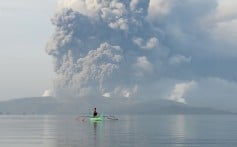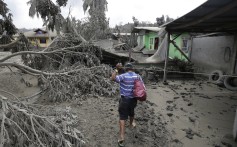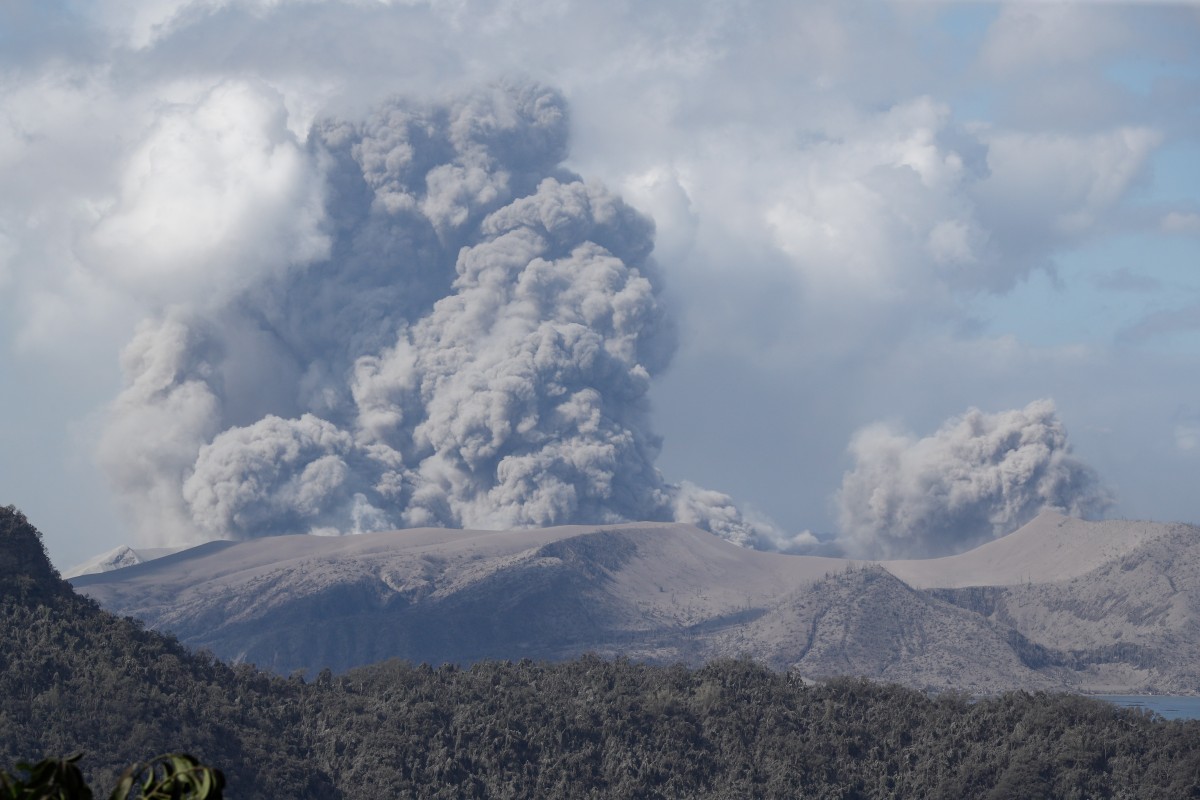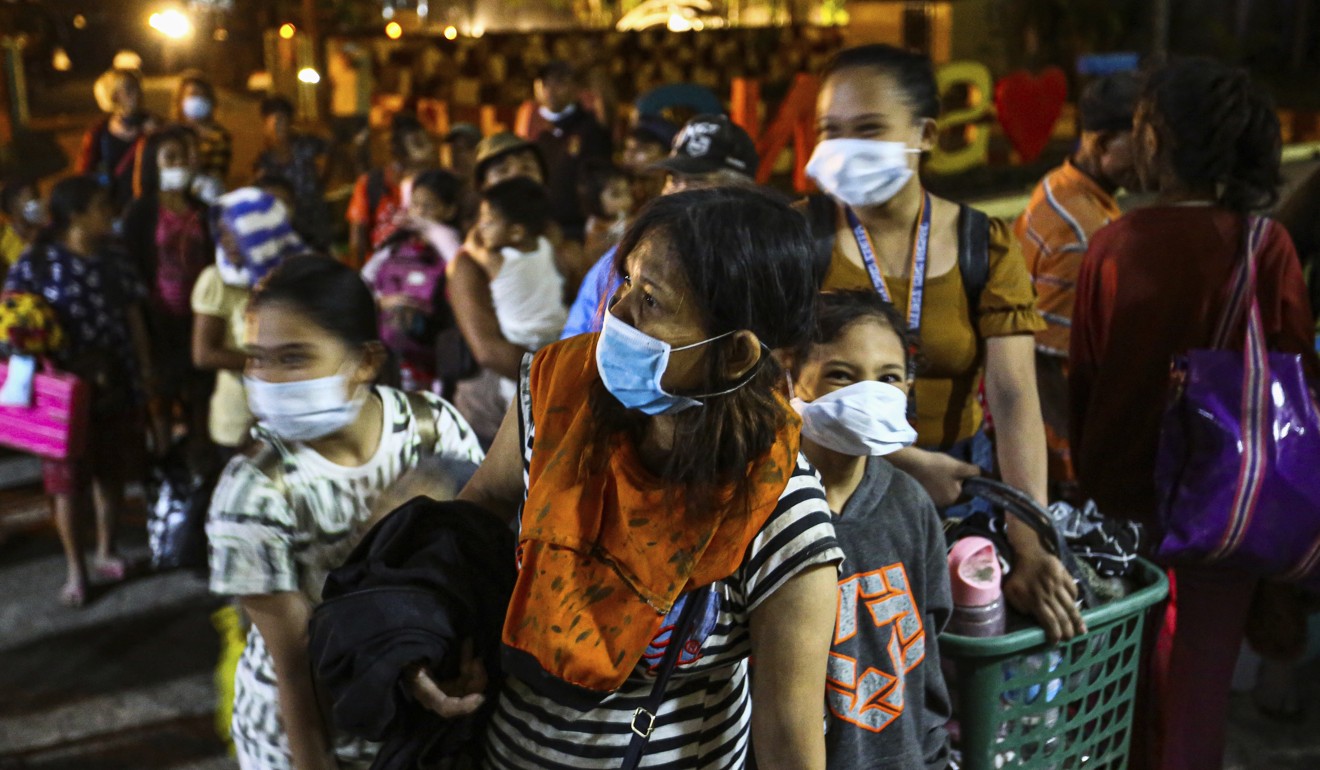The chief state seismologist said Taal’s volcanic activity had previously lasted a few days but in one instance it had gone on for seven months
Officials also sought to dissuade vendors from selling protective face masks at inflated prices after cloud of volcanic ash blew north to Manila
Raissa Robles andCompiled by SCMP’s Asia desk
Published: 14 Jan, 2020
Philippines’ Taal Volcano eruption triggers dozens of quakes, mass evacuation
14 Jan 2020

Taal Volcano: as thousands flee ash-covered towns, some decide to stay home
15 Jan 2020


Ash spews into the air from Taal Volcano. Photo: EPA
The
Philippine government has issued a dire warning about the potential of
Taal Volcano to cause mass casualties, recalling the 1991 eruption of
Mount Pinatubo which killed 847 people.
“The entire mountain collapsed during the eruption [in 1991],” said Defence Secretary Delfin Lorenzana, who also serves as chief of the National Disaster Risk Reduction and Management Council.
“That’s what we’re fearing, that the eruption would cause the entire island to rise and scatter debris on the nearby areas,” Lorenzana said. “Hopefully this won’t happen. We can never predict the actions of this volcano.”
Taal Volcano continued to tremble on Tuesday as tens of thousands of people fled ash-blanketed villages in the danger zone.
Fountains of red-hot lava spurted 500 metres into the sky with dark plumes of ash and steam reaching 2km. More than 200 earthquakes have been detected in and around Taal, 81 of which were felt with varying intensities.
“Such intense seismic activity probably signifies continuous magmatic intrusion beneath the Taal edifice, which may lead to further eruptive activity,” the Philippine Institute of Volcanology and Seismology (Phivolcs) said.
Philippine’s Taal volcano blankets surrounding towns in grey ash
Chief state seismologist Renato Solidum warned that residents should not return to their homes within a 14km radius of the volcano. In the past, Taal’s volcanic activity had lasted several days but in one instance in the year 1754, it went on for seven months, he said.
Solidum said ashfall from the volcano was problematic as a thick layer of ash on the roofs of homes could cause them to collapse, while “every time the fine ash is whipped up by vehicles or strong wind people might still inhale it”.
Demand for N95 face masks have spiked in recent days since Taal first erupted on Sunday, sending a cloud of ash 65km north to the capital city, Manila and causing hundreds of flights to be cancelled, with thousands stranded at the Ninoy Aquino International Airport. The airport has since partially resumed operations.

Residents arrive at local school after being evacuated from the heavy ash and debris from the Taal Volcano eruption. Photo: AP
Government officials warned against profiteering from the demand for masks, as supplies ran low and reports surfaced that masks were being sold for 200 pesos (US$4), a significant increase from the usual 30 pesos.
“Let us not use this occasion to prey on others,” Manila Vice Mayor Honey Lacuna-Pangan told local media.
The Chinese embassy in Manila donated 1,000 masks and the Philippines’ Department of Trade and Industry warned sellers found “profiteering” would be “dealt with to the fullest extent of the law”.
Lava, lightning and a ‘hazardous explosion within hours’, but for some Filipinos, an eerie calm
14 Jan 2020

In response, President Rodrigo Duterte suggested prices for masks, which filter airborne particles, could be capped.
“Those who cannot afford masks, we will give it free ... in times of crisis all I can do to manage the situation is [to ask] the military and police,” Duterte told reporters on Monday evening, also indicating he planned to visit the affected area on Tuesday.

The location of Taal Volcano.
When asked where he was fit enough to visit the area, Duterte replied: “I could even eat the ashfall and pee on Taal.”
Duterte also called on employers to suspend work due to the ashfall.
Taal Volcano is the most deadly in the Philippines, killing more than 6,000 in its history
14 Jan 2020

“We do not control everybody,” he said. “So, what we can only do is to tell them – and usually the statement or the narrative of the government is always a persuasive effect.”
The Department of Labour and Employment said employees who “fail or refuse to work by reason of imminent danger resulting from natural or man-made calamity should not be exposed to or subject to any administrative sanction”.

Chino Vaflor and Kat Bautista Palomar. Photo: Randolf Evan/Instagram
On Sunday, just as the volcano was erupting, Chino Vaflor and Kat Bautista Palomar were getting married at a venue less than 10km away.
“We noticed white smoke coming out of Taal during preparations around 2pm and from then on we knew something unusual was already going on with the volcano,” Randolf Evan, the couple’s wedding photographer who captured the explosion, told the BBC.
Evan said they all felt they were “definitely safe as the venue was on higher ground and not directly around the volcano’s vicinity”.
This was the condition of the horses in Taal uploaded 4 hours ago. Sana matulungan pa sila
pic.twitter.com/O0hYFpW2Te — ʸᵛᵃⁿ (@Cutiiesaurus)
January 13, 2020
Meanwhile, ING Bank also warned the disruption from Taal Volcano could create a “temporary speed bump” for the Philippine economy. The areas affected host industrial and car assembly hubs, while the Department of Agriculture estimated damage to crops and livestock worth 75 million pesos (US$1.5 million).
About 36,000 people have been evacuated from 27 towns and cities in Batangas as of midnight and being accommodated in 130 shelters, according to the Office of Civil Defence. The province of Batangas, south of the capital, has been placed under a state of emergency.
Additional reporting by Bloomberg
Taal Volcano
Volcanoes
The Philippines
Natural disasters
Raissa Robles has written for the SCMP since 1996. A freelance journalist specialising in politics, international relations, business and Muslim rebellion, she has contributed to Reuters, the Economist Intelligence Unit, Daily Mail, Times of London, Radio Netherlands and Asiaweek. She runs the award-winning investigative and opinion blog, raissarobles.com. Her book, Marcos Martial Law: Never Again, a brief history of the dictatorship won the 2017 National Book Awards for Non-Fiction. Her Twitter handle is @raissawriter.
No comments:
Post a Comment